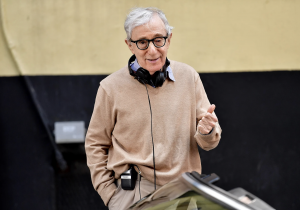
As he prepares to shoot his 50th film, reports recently emerged that erroneously suggested Woody Allen’s retirement from filmmaking was around the corner.
Speaking offhandedly to the Spanish Newspaper, La Vanguardia, Allen signaled his interests had shifted from filmmaking to fiction writing. But Allen’s team doesn’t want us to read into that.
‘Woody Allen never said he was retiring, nor did he say he was writing another novel1,’ a representative of Allen told Variety.
‘He said he was thinking about not making films as making films that go straight, or very quickly, to streaming platforms is not so enjoyable for him, as he is a great lover of the cinema experience.’
Allen has previously hinted in other interviews that his forthcoming film, Wasp 22, could be his last, but the assertion that streaming platforms killed the love of the game for Allen seem defensive, especially when you take into account his recent string of low-grossing, poorly-reviewed movies, and the octogenarian’s ailing figure.
More troublesome, however, for old Woody must be the #MeToo movement, and the new scrutiny it has placed him under.
Dylan Farrow, Allen’s adopted daughter, alleges that Allen molested her when she was seven-years-old. Between her own thirteen siblings, the legitimacy of Farrow’s claims has been publicly debated, but Allen’s relationship with another adopted daughter, Soon-Yi Previn, leaves much less open to discussion and brings to mind an adage about smoke and fire.
Allen met Soon-Yi as the adopted daughter of his partner, Mia Farrow, at the start of their twelve-year relationship. Near the end of this relationship, Allen began an affair with Soon-Yi, and photographed the then 21-year-old nude. Amid the fallout of Farrow and Allen’s separation, Allen married Soon-Yi in 1997.
As noted by Matt Shore in his excellent write-up in the Collider, ‘during that time, as before and seemingly eternally, Allen has produced works dealing with complicated romances and relationships, all of which feel less enjoyable when placed in the context of his not-so-private life.’
Fans of any embattled creative will implore we “separate art from the artist”: a completely sensible rule of thumb that should allow public criticism of an artist’s misdeeds, without their fans chomping to play devil’s advocate. But alas, this statement is more often used as an excuse by said fans to not criticise at all.
Besides, when it comes to Woody Allen, we separate art from the artist at our own peril.
Art is not created in a vacuum, it is a representation of context, and it becomes difficult to pry Allen’s personal life from his professional, when one of his best-known films, Manhattan, is literally about a middle-aged man (played by a then 44-year-old Allen) dating a 17-year-old girl, portrayed as a temptress. To write, direct, and shoot a film of this nature starring oneself is icky to begin with, not to mention garish considering his later controversies.
In fact, Allen regularly casts himself as the silly, yet sympathetic (and often, unbearably pretentious) protagonist in his films, which tend to feel like voyeuristic fantasies2; fulfilled for Allen in his own make-believe worlds, and witnessed by eager cinema-goers.
But when we do separate the art from the artist, the corroborating evidence that convicted Bill Cosby or Harvey Weinstein is not likely there to convict Allen.
Considering his creative – and recently commercial – failures, and the negative press associated with his past, including credible allegations of child-grooming, Allen seems to have been given more chances than most in the public eye. As is the case with Roman Polanski, an elite culture of ‘buying-in’ to a filmmaker seems to wash away and grey area. They simply become a hilarious, genius, once-in-a-generation filmmaker whose vision reveals the soul of a subculture that no one else can.
But surely those who adore Allen can’t be the drivers of our public narrative? Allen’s image as a creative intellectual is almost fraudulent. He is a pseudo-smart, entitled man who, shy of actual academic aptitude, makes his living selling his own self-image back to other elite phonies. Can their summary of Allen as a “genius” really be the working definition we’re still chained to today?
To quote Matt Shore again, ‘the man who thought it would be artistic to present a black-and-white film in which he dates a high schooler is the same man who took nude photographs of his college freshman stepdaughter.’
‘Maybe the reason that Woody Allen pushed back so quickly on rumors of retirement is that part of what drives him is his desire to see how much he can get away with while everyone’s watching. If his motivation is purely selfish, then there would never be a reason for him to stop. But that doesn’t mean that filmgoers have to support his pursuit for as long as he clings to it.’
The dexterity with which Allen concocts his imagined self, and then presents it as authentic, is more impressive than most of his actual artistic work. It is remarkable – the longevity of his myth-making.
Allen’s entitlement and pretentious sensibility would immediately wear-thin were he coming up today. For all of our sakes, I hope his 50th film will be his last.





